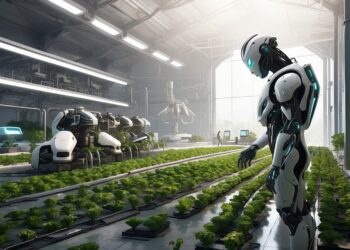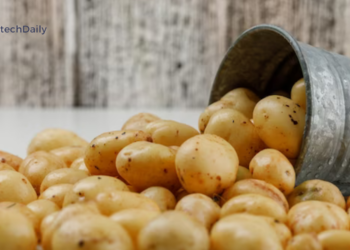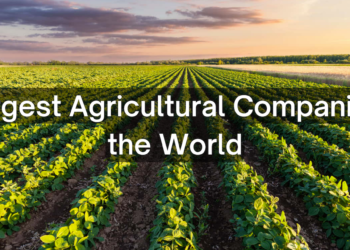The agricultural industry has come a long way since its inception, evolving from traditional farming methods to more technologically advanced practices. Agriculture 4.0, often referred to as Smart Farming or Digital Farming, represents the integration of cutting-edge technologies into agricultural processes. The goal of Agriculture 4.0 is to improve efficiency, sustainability, and productivity in farming while addressing the challenges of feeding a growing global population. In this article, we will explore the concept of Agriculture 4.0, the technologies driving its advancement, its benefits and challenges, and the importance of responsible implementation for a sustainable future.
Smart farming, also known as precision agriculture or Agriculture 4.0, represents a groundbreaking approach to modern agriculture. It harnesses the power of technology and data-driven practices to transform traditional farming into an intelligent, efficient, and sustainable industry.
Understanding Agriculture 4.0

Agriculture 4.0 is a paradigm shift in the agricultural sector, leveraging the power of digital technologies to transform traditional farming practices. It involves the integration of various technologies, such as the Internet of Things (IoT), Artificial Intelligence (AI), Big Data, and robotics, to optimise and automate farming operations. Smart sensors, drones, autonomous machinery, and data analytics play pivotal roles in enabling farmers to make data-driven decisions and achieve better crop yields with reduced resource usage.
Need of Agriculture 4.0
Agriculture 4.0, often referred to as smart farming or precision agriculture, cannot be overstated. It represents a significant leap forward in modernising the agricultural sector by harnessing cutting-edge technology and data-driven approaches. Here are some key reasons highlighting the Need of Agriculture 4.0:
- Enhanced Productivity: Agriculture 4.0 integrates data analytics, sensors, and automation, allowing farmers to monitor and manage their operations with unprecedented precision. This results in increased productivity, as farmers can make informed decisions about planting, irrigation, fertilisation, and pest control.
- Resource Efficiency: Smart farming optimises resource usage, reducing waste and minimising the environmental impact of agriculture. It enables precise delivery of water, fertilisers, and pesticides based on real-time data, thus conserving resources such as water and reducing chemical inputs.
- Sustainability: Sustainability is a top priority in modern agriculture. Agriculture 4.0 promotes sustainable practices by reducing carbon footprints, conserving natural resources, and promoting responsible land management. This approach ensures that agriculture can meet the needs of the present without compromising the ability of future generations to do the same.
- Data-Driven Decision-Making: The collection and analysis of data lie at the core of Agriculture 4.0. This data-driven approach enables farmers to make informed decisions about crop health, soil quality, weather conditions, and more. It allows them to respond quickly to changing circumstances and manage their farms with greater precision.
- Cost Reduction: While there may be initial investments in technology and infrastructure, the long-term benefits of Agriculture 4.0 often result in significant cost reductions. Efficiency improvements, increased yields, and reduced resource usage contribute to economic sustainability for farmers.
- Global Food Security: With a growing global population, ensuring food security is a pressing concern. Agriculture 4.0 can help meet this challenge by increasing agricultural production while conserving resources. It empowers farmers to produce more food with fewer inputs.
- Innovation and Entrepreneurship: Agriculture 4.0 opens up opportunities for innovation and entrepreneurship in the agricultural sector. Tech startups and established companies are developing a wide range of solutions, from precision agriculture tools to agricultural drones and IoT-based farm management systems.
- Rural Development: Smart farming technologies can stimulate rural development by creating job opportunities in technology-related agriculture fields. It can also improve the quality of life for rural communities by making farming more efficient and economically viable.
Agriculture 4.0 is not only important but essential for the future of agriculture. It offers solutions to some of the most significant challenges facing the sector, from increasing productivity to ensuring sustainability and addressing the global food security issue. By embracing technology and data-driven approaches, Agriculture 4.0 paves the way for a more efficient, sustainable, and productive agricultural industry.
Key Technologies Driving Agriculture 4.0

- Internet of Things (IoT): IoT devices, such as sensors and actuators, are deployed in fields to monitor and collect real-time data on soil moisture, temperature, humidity, and other critical factors. This data enables farmers to make precise decisions about irrigation, fertilisation, and pest control.
- Artificial Intelligence (AI) and Machine Learning: AI algorithms analyse vast amounts of data collected from IoT devices, historical data, and external sources to predict crop diseases, optimise planting schedules, and suggest personalised treatment plans for each crop.
- Big Data Analytics: The large-scale collection and analysis of agricultural data help identify patterns, trends, and anomalies that can lead to informed decision-making and more efficient farming practices.
- Robotics and Automation: Smart farming embraces the use of autonomous machinery and robots for various tasks, such as planting, weeding, harvesting, and livestock management. These technologies reduce the reliance on manual labour and increase overall productivity.
- Precision Agriculture: Precision agriculture techniques involve the application of inputs (water, fertilisers, pesticides) with greater accuracy, targeting specific areas of the field that require attention. This reduces wastage and ensures optimal resource utilisation.
- Vertical Farming and Indoor Agriculture: Vertical farming and indoor agriculture employ controlled environments, hydroponics, and artificial lighting to grow crops efficiently in vertically stacked layers or indoor facilities. These approaches optimise space and reduce the impact of weather and climate on crop growth.
Benefits of Agriculture 4.0
- Increased Efficiency: Smart farming technologies streamline agricultural processes, leading to increased efficiency in resource use, time management, and labour allocation. This, in turn, leads to higher crop yields and reduced operational costs.
- Sustainable Resource Management: Agriculture 4.0 promotes responsible resource management by providing precise data on water, fertiliser, and pesticide usage. This reduces environmental impact and helps farmers adopt sustainable farming practices.
- Enhanced Crop Health and Quality: By using AI and data analytics, farmers can detect early signs of crop diseases and nutrient deficiencies, allowing for timely interventions and improved crop health and quality.
- Climate Resilience: Smart farming technologies enable farmers to adapt to changing climatic conditions and extreme weather events. By predicting weather patterns and adjusting planting schedules, farmers can mitigate risks and optimise yields.
- Real-time Monitoring and Decision-making: The ability to monitor fields in real-time and access data remotely empowers farmers to make timely decisions and respond to challenges promptly.
- Reduced Food Waste: Precision agriculture techniques reduce food waste by minimising the over-application of resources and optimising harvest timings, resulting in better crop quality and reduced spoilage.
Challenges and Responsible Implementation

While Agriculture 4.0 presents numerous benefits, its implementation also poses challenges that require careful consideration for responsible adoption:
- High Initial Investment: The upfront costs associated with acquiring smart farming technologies and implementing necessary infrastructure can be a barrier for some farmers, especially small-scale farmers in developing regions.
- Data Privacy and Security: The collection and sharing of agricultural data raise concerns about privacy and cybersecurity. Ensuring data security and respecting farmers’ privacy rights are essential for responsible adoption.
- Digital Divide: The digital divide between urban and rural areas can hinder access to smart farming technologies for some farmers. Efforts must be made to bridge this divide and provide training and support to farmers in adopting digital solutions.
- Over-Reliance on Technology: While smart farming technologies are valuable tools, they should not replace farmers’ expertise and traditional knowledge. A balance between technology and traditional farming practices is crucial for responsible implementation.
- Environmental Impact of Technology: The production and disposal of high-tech agricultural equipment and devices may have environmental implications. Sustainable manufacturing and recycling practices should be considered to mitigate such impacts.
- Accessibility and Inclusivity: The benefits of smart farming should be accessible to all farmers, regardless of farm size, location, or socioeconomic status. Inclusivity is essential for achieving equitable and sustainable agriculture.
Conclusion
Agriculture 4.0 represents a transformative journey in the agricultural sector, promising increased productivity, sustainability, and resilience. The integration of advanced technologies such as IoT, AI, and Big Data offers new possibilities for responsible farming practices that can address the challenges of food security and environmental sustainability. However, the responsible implementation of smart farming is crucial to ensure equitable access, data privacy, and environmental protection. By embracing Agriculture 4.0 responsibly, farmers can navigate the evolving landscape of modern agriculture and pave the way for a more sustainable and prosperous future in farming.









